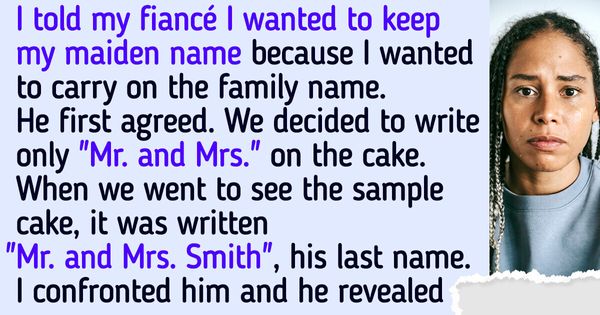The decision of whether or not to take your partner’s last name can be a significant and personal one. It’s a choice that should reflect your own desires and values. However, when this decision becomes a battleground for control and manipulation, it transforms a deeply personal choice into a source of conflict and distress.

One woman’s story
Last December, my fiancé (m25) and I (f23) got engaged. It was unexpected and sudden, but I accepted because I love him and can’t imagine a future without him. During our wedding-related discussions, I expressed my desire to keep my maiden name and not adopt his. I want to carry on my family name for my parents and give my future children the choice of which last name they want to go by. My fiancé assured me that he was okay with my decision.

As the wedding drew closer, we went to sample our cake. I was shocked when I saw that the words “Mr. and Mrs. Smith” (my fiancé’s last name) were printed on it. I had specifically asked for just “Mr. and Mrs.” Thinking it was a mistake, I asked the cake planner to correct it. To my surprise, he told me that my fiancé had called him and requested that the last name be included.

On our way home, my fiancé explained that he was not comfortable with me keeping my last name. He had spoken to his mother, who criticized him for agreeing to my wishes, calling it “feminine, weak, and woke.” She even said he was signing up for a toxic marriage. I later found out that he had also instructed the wedding planning staff to change table centerpieces, handouts, and more to include “Mrs. and Mr. Smith” instead of our separate last names, with his mother’s help.
We argued, and I told him I would call off the wedding if he didn’t respect my wishes. I also made it clear that I didn’t want his mother attending the ceremony. He moved out and hasn’t talked to me since.

People on her side
Many people expressed support for the woman’s decision and the way she handled the situation. They highlighted the issue of her fiancé going behind her back and making major changes without discussing it:

- “You just got a preview of how his mother is going to overstep in this marriage and how he’s going to go along with whatever mummy says.”
- “It’s better to lose the wedding deposits than go through a divorce.”
- “He doesn’t have to agree with you. He can think that it would have been nice if you changed it. But he should communicate. Explain himself. Express that he would have loved to share the name. And then leave it because it is your choice.”
She later shared an update
The woman made the decision to call off the wedding and informed her fiancé via text. She also received a call from his mother who berated her over the phone and threatened to make her life a living hell. Concerned for her safety, she made plans to change her locks and install a security camera. She also received nasty messages from her ex-fiancé’s friends, threatening her for her decision. Despite the challenges she faced, she decided to donate the wedding food to a nearby homeless shelter and canceled all other wedding arrangements.
In the end, the decision of whether or not to take a partner’s last name should be a mutual and respectful agreement that reflects the values and identities of both individuals. When faced with manipulation and coercion, it becomes essential to recognize and assert one’s own boundaries and desires.





